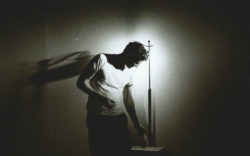
Jonathan Byrd
Jonathan Byrd has a way with words. “It took me a long time to be from the South,” he says. The singer-songwriter, a seventh-generation Carolinian, lived in Germany as a child and joined the Navy as a young adult, traveling around the world and generally avoiding his roots. In fact, it wasn’t until a trip to the U.K. that he became truly interested in Southern music.
“I played terrible, dark math-rock, did drugs, and avoided responsibility if at all possible until I was almost 30,” he says. “I couldn’t keep a band together, so I started playing more acoustic guitar. A girlfriend dragged me to Ireland for a festival, and that opened a window back into the past.”
On his own and as a part-time member of local world-music outfit Dromedary, Byrd has carved out a name for himself by exploring the past through sound, whether a collective (“The Young Slaver”) or a personal (“Father’s Day”) one. His music bears familiar folk instrumentation—acoustic guitar, fiddle, dobro—and is steeped in the rich tradition he once resisted.
“Southern music is my music, and the culture is my culture,” he says now. “The greatest gift of all, as a poet, is the Southern language. An Arab friend told me [about] when he first came to the Carolinas: ‘I thought everyone was singing to me.'”
Folk music, after all, is supposed to be for folks, even if its role in our modern culture is unclear. Byrd, one of its most earnest and talented purveyors, wonders if there even is such a thing anymore.
“In the U.S., we dumped our folk culture when Bob Dylan told us to, essentially. So, maybe we’re remembering. Maybe I’m a part of that. I don’t know. You can’t drive the car and watch the race.”
Like what you just read? Support Flagpole by making a donation today. Every dollar you give helps fund our ongoing mission to provide Athens with quality, independent journalism.










